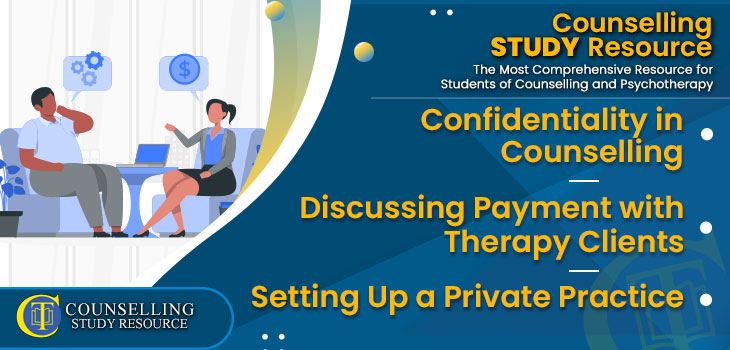277 – Discussing Payment with Therapy Clients
Confidentiality in Counselling – Setting Up a Private Practice
In Episode 277 of the Counselling Tutor Podcast, your hosts Rory Lees-Oakes and Ken Kelly take us through this week’s three topics:
- Firstly in ‘Student Services’, Rory and Ken look at confidentiality.
- Then in ‘Ethical, Sustainable Practice’, we look at discussing payment with your therapy clients, particularly if you are running your own practice.
- And lastly in ‘Practice Matters’, Rory speaks with Nicola Currie about the basics of starting a private practice.
Confidentiality in Counselling [starts at 02:42 mins]
Counselling Foundations is sponsored by
Counselling Skills Academy
Learn counselling techniques by seeing counselling skills used in real sessions by qualified therapists.
Real sessions - real-life presentations - real skills.
Confidentiality isn’t about keeping secrets, it’s about keeping yourself and your client safe.
The main points of this section include:
- Contracting – you will set out and agree on what the exceptions to confidentiality are with your client in the first session.
- Confidentiality allows the client to feel safe and secure, they should feel able to speak freely.
- Keep in mind laws and policies when contracting your confidentiality.
- Informed consent – make sure the client understands what the terms of your confidentiality is during your practice.
- Keep a record of what is said and discussed between you and the client – this allows you to confirm you have made the client aware of your confidentiality exceptions.
- After the first session discussing the contract, consider revisiting it briefly in the second session to ask if they have any questions, etc.
- If you're working online, the way you think about your confidentiality might be slightly different.
- Are you sharing details over email? Are these emails secure?
- When working in a room – could someone hear you if they were stood outside the room? Is there a window that people can easily look into?
- Disposing of records – paper notes can be destroyed e.g. by shredding or burning.
- Digital notes need to be thought about a little bit more. Is where you’re storing them secure? Password protected?
- Keep note of what you have deleted, e.g. ‘notes deleted 2013-2018’.
- Be conscious of where you’re taking your notes. If they're kept on a laptop and you’re taking that somewhere with you, what happens if it gets lost/stolen?
A handout on Good Confidentiality Habits for Counsellors is available for download in the green button above.
Discussing Payment with Therapy Clients [starts at 29:09 mins]
Unlike working for an agency, private practice will require you to charge the client a fee directly. In this section, Rory and Ken discuss how you might approach discussing payment with your counselling clients.
- Some people might find it uncomfortable/difficult to ask for payment from a client.
- Think about what your own relationship with asking for payment is.
- Your fee will be set out in your contact and agreed upon by both you and the client before counselling takes place.
- Before discussing payment with your therapy clients, you need to first consider how the payment will be taken. Will you take it in advance? Will it be paid online? Will the client receive the charge as an invoice after the session?
- Think about including in your contract what happens if a client doesn’t show up for a session without notice – will you still charge them for your time?
- Consider having a separate bank account for therapy clients to pay into – this will help protect the clients’ confidentiality compared to if it were being paid into a joint account.
- Remember: you deserve to be paid for your time and your knowledge.
Setting Up a Private Practice [starts at 41:24 mins]
The National Counselling Society is proud to sponsor Practice Matters.
NCS are really excited to have launched their Children and Young People Therapist Register for counsellors working with the younger age group.
In this week’s ‘Practice Matters’, Rory speaks with Nicola Currie about setting up your own private practice.
The key points of this discussion include:
- Setting up your own private practice can feel overwhelming, and you might not know where to start.
- Value your skills, experience, and training.
- When setting up your own practice, there’s a few things you might have to arrange and pay for: supervision, a website, and some people may need to rent a room if they’re not planning to work at home.
- If you are planning to work from home, make sure you have a good lone-working policy in place to keep yourself safe.
- More often than not, a client will go to Google to find a counsellor – this is where having a well made website can be helpful in finding you clients.
- However, having a website isn’t necessary, and it doesn’t have to cost you thousands.
- If you have a strength in a certain area, niche, or modality – advertise this! You could be exactly what a client is looking for.


